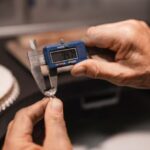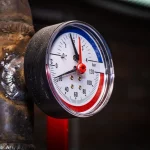While choosing a differential pressure gauge, it’s important to take into account a number of important considerations, including the intended use, environmental factors, accuracy standards, and financial constraints. The following are some things to take into account while choosing a differential pressure gauge:
Pressure range
The differential pressure gauge’s pressure range needs to be compatible with the system’s working circumstances. Be that the gauge can resist the highest pressure that might be encountered and that its range is adequate to measure the anticipated differential pressure.
Accuracy
Establish the measurement’s desired level of accuracy. This will depend on the particular application and what happens if the readings are off. A high-accuracy gauge could be required for sensitive applications, like those concerning safety or regulatory compliance.
Environment
Consider the temperature, humidity, and exposure to corrosive or abrasive materials in the environment where the gauge will be utilised. To ensure accurate and dependable performance, choose a gauge that can resist the ambient conditions of the application.
Mounting
Choose the gauge’s best mounting technique. The most common mounting methods for differential pressure gauges are threaded connectors and flanges. Make sure the mounting technique is appropriate for the system and that it is simple to reach the gauge for calibration and maintenance.
Miniaturization
Smaller and more portable pressure measurement devices have been made possible by the trend towards downsizing. These devices are particularly helpful in applications where space is at a premium or mobility is crucial.
Display
Think about the display type that is required for the application. Differential pressure gauges can have digital or analogue displays, and some types may also incorporate extra functions like alarms, data logging, or wireless connection.
Budget
Finally, think about the differential pressure gauge’s budget. It’s crucial to strike a balance between performance demands and financial restraints because prices might vary greatly based on the features and capabilities of the gauge.
You may choose the best differential pressure gauge for your unique application by taking these parameters into account, resulting in an accurate and dependable measurement of differential pressure in your system.



